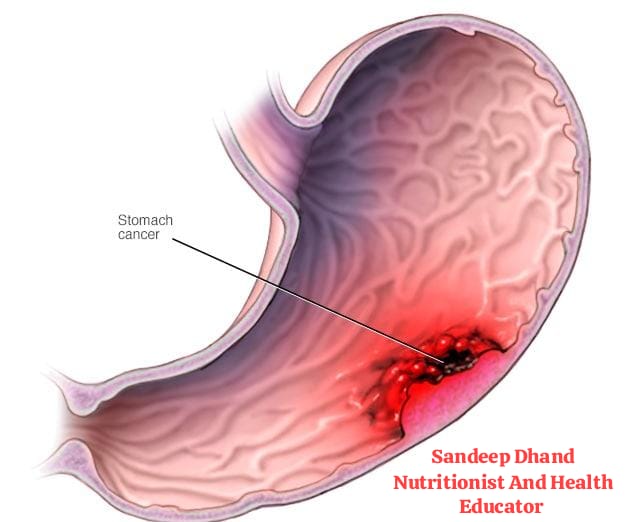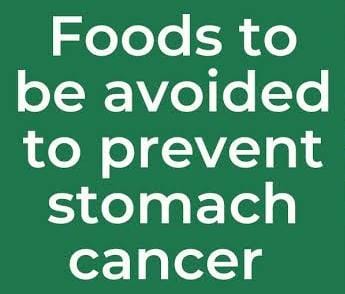Sandeep Dhand
Nutritionist And Health Educator
Introduction
Stomach cancer, also known as gastric cancer, is a type of cancer that begins in the lining of the stomach. It develops when the cells in the stomach grow abnormally and uncontrollably. Though stomach cancer is not as common as other types of cancer, it remains one of the leading causes of cancer-related deaths worldwide.
This article will discuss stomach cancer in detail, including its causes, symptoms, risk factors, diagnosis, treatment, and whether a proper diet plan can help manage or cure it.
Understanding Stomach Cancer
What is Stomach Cancer?

Stomach cancer occurs when malignant (cancerous) cells form in the stomach lining. The stomach is a vital organ in the digestive system, responsible for breaking down food and absorbing nutrients. Cancer in this region can interfere with digestion and spread to other parts of the body if not treated early.
Types of Stomach Cancer
There are different types of stomach cancer, including:
- Adenocarcinoma: The most common type, accounting for about 90-95% of stomach cancers. It develops in the mucus-producing cells of the stomach lining.
- Gastrointestinal Stromal Tumors (GISTs): These are rare tumors that develop in the stomach’s connective tissues.
- Lymphoma: Cancer that starts in the immune cells of the stomach.
- Carcinoid Tumors: Slow-growing tumors that develop in the stomach’s hormone-producing cells.
- Squamous Cell Carcinoma and Small Cell Carcinoma: Rare types of stomach cancer.
Causes and Risk Factors of Stomach Cancer
What Causes Stomach Cancer?
Stomach cancer develops when mutations occur in the DNA of stomach cells, leading to uncontrolled growth. While the exact cause of these mutations is not always clear, several factors increase the risk of stomach cancer.
Risk Factors for Stomach Cancer
The following factors can increase the likelihood of developing stomach cancer:
- Helicobacter Pylori (H. Pylori) Infection: This bacterium can cause chronic inflammation and increase cancer risk.
- Dietary Factors: Consuming excessive salty, smoked, or processed foods can damage the stomach lining.
- Tobacco and Alcohol Use: Smoking and heavy alcohol consumption increase stomach cancer risk.
- Genetic Factors: A family history of stomach cancer can raise the risk.
- Gastric Ulcers: Chronic ulcers caused by H. pylori or long-term acid reflux can lead to cancer.
- Obesity: Being overweight may contribute to an increased risk of stomach cancer.
- Pernicious Anemia: A condition caused by vitamin B12 deficiency that affects stomach lining cells.
- Age and Gender: Stomach cancer is more common in older adults, particularly men.
Symptoms of Stomach Cancer
Early-Stage Symptoms
In the initial stages, stomach cancer may not cause noticeable symptoms, making it difficult to diagnose early. Some early signs include:
Indigestion or heartburn
Loss of appetite
Mild stomach discomfort
Feeling full after eating small amounts
Nausea or slight bloating
Advanced-Stage Symptoms
As the disease progresses, more severe symptoms may appear, such as:
Unintentional weight loss
Severe stomach pain
Vomiting (sometimes with blood)
Difficulty swallowing (dysphagia)
Black or bloody stools
Fatigue and weakness
Swelling in the abdomen
If these symptoms persist for a long time, medical attention is necessary.
Diagnosis of Stomach Cancer
Medical Tests for Stomach Cancer
Doctors use various tests to diagnose stomach cancer, including:
- Endoscopy: A tube with a camera is inserted into the stomach to check for abnormal growths.
- Biopsy: A tissue sample is taken during an endoscopy and examined for cancer cells.
- CT Scan or MRI: These imaging techniques help detect tumor size and cancer spread.
- Blood Tests: To check for anemia and tumor markers.
- PET Scan: Helps detect cancerous areas in the body.
Early diagnosis improves the chances of successful treatment.
Treatment Options for Stomach Cancer
- Surgery
Surgery is the most effective treatment if the cancer is detected early. Types of surgeries include:
Partial Gastrectomy: Removal of a portion of the stomach.
Total Gastrectomy: Complete removal of the stomach, with the esophagus connected to the small intestine.
- Chemotherapy
Chemotherapy involves using drugs to kill cancer cells and shrink tumors before or after surgery.
- Radiation Therapy
Radiation therapy uses high-energy rays to destroy cancer cells and shrink tumors.
- Targeted Therapy
This treatment targets specific cancer-causing proteins, reducing harm to healthy cells.
- Immunotherapy
Immunotherapy boosts the immune system to fight cancer cells effectively.
Treatment choice depends on the stage and severity of the disease.
Can a Diet Plan Help Treat or Manage Stomach Cancer?
Role of Diet in Stomach Cancer Prevention and Management
While diet alone cannot cure stomach cancer, a proper nutrition plan can:
Reduce cancer risk
Support recovery during treatment
Improve overall health
Best Foods for Stomach Cancer Patients

- Fruits and Vegetables: Rich in antioxidants and vitamins (e.g., berries, carrots, spinach).
- Whole Grains: Brown rice, quinoa, and oats provide essential nutrients.
- Lean Proteins: Chicken, fish, eggs, and plant-based proteins help maintain strength.
- Healthy Fats: Nuts, seeds, and olive oil support overall health.
- Probiotics: Yogurt and fermented foods support digestion.
Foods to Avoid

Processed meats and red meat
Excessive salt and pickled foods
Alcohol and tobacco
Sugary foods and beverages
Hydration and Meal Planning
Drinking plenty of water and consuming small, frequent meals help improve digestion and prevent discomfort.
Conclusion
Stomach cancer is a serious disease that can be influenced by genetics, lifestyle, and diet. Early diagnosis and treatment, including surgery, chemotherapy, and targeted therapies, improve survival chances. Although a well-balanced diet cannot cure stomach cancer, it plays a crucial role in prevention, recovery, and overall well-being.
Maintaining a healthy lifestyle, avoiding processed and unhealthy foods, and undergoing regular medical check-ups can help reduce the risk of stomach cancer. If diagnosed, following a nutrient-rich diet and medical advice can improve quality of life and treatment outcomes.
